WARNING! Tired people brace yourselves: this is a ridiculously long blog, even for me, with a stupid amount of pics. But can I help it if Dakar was this fascinating?
The Art of Living
Stumbling upon the Lou Bess Farmers Market outside Ngor Lounge our first Saturday in Dakar, it was like we had wandered into a Cape Town southern suburb on a weekend. There was a similar range of rainbow hippies selling a similar selection of tempting yummy produce, just a fascinating difference in ingredients.
I was thrilled to see that all the delicious natural products we had met on our journey through West Africa – from the dried bissap tea of Cote d’Ivoire to the moringa leaf of Liberia – were at last being transformed into a range of commercially viable products in Senegal. Did you know that moringa contains twice as much protein as yoghurt, 3 times as much potassium as bananas, 4 times as much calcium as milk, 4 times as much vitamin A as carrots and 7 times as much vitamin C as oranges?
Environmental development group Nébéday supports the Jappo Liggey women’s cooperative to plant one for every euro donated. Powdered leaves of this drought-resistant ‘tree of life’, native to the Himalayas, are prescribed for malnutrition, aneamia, gastric problems, fatigue, blood pressure, diabetes and lactation regulation. It can also be used for water purification and as soap for hand washing!

African made beauty products using indigenous ingredients like coconut oil, shea butter and local honey
Yummiest of all was the fresh milk and yoghurt on offer from real Senegalese cows of the Dolima co-op. The award-winning Laiterie du Berger currently employs 800 Fulani herding families in an attempt to create a local industry robust enough to challenge the evil monopoly of imported powdered milk, which accounts for 90% of consumption.
I can’t tell you how excited we were. We hadn’t seen real milk since Namibia and when I got Sampson to taste one of their creamy free samples, he said Dolima yoghurt was so delicious “it might just be the thing that tips you over into living here”…
Even more cheering than seeing locally manufactured products was seeing a pile of locally published books including Dakaroises poetry. A month later, we were living on the site where the market takes place. As the stalls were being set up early in the morning, I caught sight of a guy who’d just got out of a taxi and was about to take a photo of Big Reg.
“Simon??!” I shouted, recognising him from the Little Baobab blog “Simon Fenton?” He was as gobsmacked as me as he had no idea who I was! I told him his blog had been recommended to me by a friend of mine, and I was very sad we hadn’t had time to drop in to his place in Casamance because we were running late to cross the Sahara – and now here he was!
Simon had come to Dakar to promote his book Squirting Milk At Chameleons, a frank and winning account of his journey from self-exiled British traveller to finding love and purpose as a family man in rural Senegal. He told me Big Reg looked like the Daddy of his overlander ‘Kermit’ featured on the front cover! He sold 27 books that day, including one to me – and has recently launched another, Chasing Hornbills.
We met Nathan’s wife Mina Fuhr for the first time that day: she popped up like a pixie, a radiant-complexioned Japanese/German who multitasks as a yoga teacher, professional belly dancer and vegan recipe creator. She was there selling copies of her cookery book Mother’s Milks, an autobiographical account of how to fall in love with good-for-you food doubling as a survival guide to eating disorders.
Sampson was busy coming to the rescue of a South African’s Senegalese wife. Phillip Steenkamp was away working as an engineer to finance his fledgling farm Sunu Tool, so his wife Rachel had come alone to the market to sell their home-made boerewors but quickly realised that braaing is not as easy as her hubbie makes it look. She was saved by Sampson who replaced a broken bolt on her braai and gave her some tips for cooking with charcoal. He was rewarded with two packs of scrumptious boerwors, seasoned only with fresh coriander, salt and pepper – no cereal, no MSG. It’s the first time I’ve been able to eat it for years. Maneer Steenkamp, we salute you!
Big Reg had a succession of visitors including an American/Senegalese family from Atlanta with two surfing daughters – go girls! – and a British teacher who reads my blog. I was gobsmacked again.

Lovely to meet Momar and Kristin Ndiaye, their surfing daughters Aneesa and Jayla, teacher Carrie Tooth (r) and entrepreneur Fatou Seck (l)
I rushed to snag a bagful of organic veg from Mamadou and Nicole’s Taaru Askan farm before it all disappeared, not just peppers, carrots and sweet potatoes, but also lettuce, rocket and BROCCOLI. We hadn’t seen that since Namibia either, not locally grown and affordable. I can’t tell you how delicious it was. Thanks to Nicole’s advice, I cooked the leaves as well.
When Zama arrived, I took her to buy some and Nicole surprised me by saying how inspired she’s been by us following our dream to travel. She has been feeling too scared to quit her job as an international student volunteer coordinator and follow her passion for the farm. “You just went for it, and with kids too! I have to be more brave…”
Somehow I still can’t convincingly explain how, for me, it would have been braver to stick with the dull sublunary routine of school-work-school-work-escape-at-the-end-of-the-year; how it kills me to know exactly what I’m going to be doing a month from now, how I thrive on living in the moment. Surely ‘brave’ is doing the right thing for your family, against your nature – not indulging a craving for adventure?
She also complimented me on my “mature, intelligent and articulate” daughter, who’d been helping her out that morning. However, Ruby was about to give us an example of the exact opposite behaviour. My Uncle John and Auntie Jill will know what I mean when I say “She pulled another disappearing act à la Royal Priors”…
Ruby had been hanging out with three of Nicole’s young American volunteers. She had asked permission from her Dad to “go for a walk with them” (note, she hadn’t asked me). About half an hour later, Nathan told us he had pre-ordered Ceebu Jën (Wolof) a.k.a. Thiéboudienne (French) for us at his favourite place, just down the road. When Sampson phoned Ruby to call her back to eat, he found they were now “in a taxi on their way to the trampolines”. “Whaat? Get back here NOW!”
While we tucked into plates of Senegal’s deliciously healthy national dish of simmered fish, veg, rice and tamarind relish, and I tried not to worry about my daughter, we heard more of Nathan’s story. His father was a high ranking CIA official who worked all over the world. Nathan was born in Dakar and since 9/11 has rejected the ‘American dream’ lifestyle and has chosen to live as a Senegalese rather than an American. He trained as a classical conductor and has worked here as a drum teacher and part time entrepreneur, but he has centred his career around creating an annual celebration of the Senegalese master of the sabar drum, Doudou Ndiaye Rose.
Doudou collaborated with musicians such as Josephine Baker, Miles Davis and the Rolling Stones and was revered internationally in countries as diverse as Japan and Spain. But in his later years, before Nathan’s homage, Doudou was sorely neglected by his own government. Nathan organised and conducted a very successful series of mass drum orchestra and improvised dance events called Deggi Daaj showcasing his master’s unique skills annually for four years. Nathan’s spotlight reintroduced Doudou to the mainstream and granted him some of the national acknowledgement long denied. Last year, just a few days after their final event, he passed away peacefully at the age of 85.
While we were there, Nathan was asked to attend an official ceremony to rename a square in Doudou’s honour in a quarter of the old city called Medina. While such acknowledgements offer some balm, Nathan is understandably feeling somewhat lost right now without the direction and guidance of his mentor, and saddened as Doudou’s extended musical family seems to be splintering and struggling to find cohesion.
At this point, I received a ‘please call me’ from Ruby. Her volunteer friends had left to go home in the opposite direction, so she was now alone in a taxi whose driver didn’t know where Ngor Lounge was, and sobbing, realising how stupid she’d been to leave in the first place. Thankfully a) Nathan speaks Wolof and put the restaurant manager on to give exact directions to the driver and b) this is Dakar, where (Nathan assured me) a 14 year old girl alone and crying in a taxi is guaranteed to be looked after and not taken advantage of. I only had to endure about 10 minutes of minor panic before she was delivered safe and sound.
Later she admitted she’d felt peer pressure until she realised they were really nice people and wouldn’t have thought any less of her if she’d said “Oh my Dad will be cross if I come with you” and concluded she’d been putting it on herself. To be fair, she was totally out of practice with peers, and had her head turned by the excitement of the whole occasion. But to be so enamoured of company as to Totally Forget Everything We’ve Ever Told Her about telling us where you’re going/knowing exactly where the truck is/checking you’ve got credit on the phone…? It was a big lesson, for all of us.
Mina and Nathan don’t have a car; Mina travels to all her gigs in the middle of night over weekends via taxi and never feels afraid. This was a revelation for me. It’s such a novelty for a woman used to the social norms of South Africa, to find a city where you can feel completely safe travelling alone in the middle of the night.
The next afternoon, I set off to meet Simon, having read his book in less than 24 hours. We drove down to the Plateau for a drink at the idiosyncratic Hotel Sokhamon, where he generously shared lots of info about his wonderful publishers Eyebooks, who focus on producing works by “ordinary people doing extraordinary things”.
Si also told me about the Biennale launch party which had taken place at the old station the night before. The art world cognoscenti of NYC, London and Paris were all there, many apparently with dyed grey hair. I’m so out, I’m in!
We were interrupted by a tall, graceful woman who heard us mention her home country Guinea-Bissau. Justine Mendy speaks perfect French, lives in Accra and is as much in love with Dakar as we are. While Simon was chatting with her, her companion Maudo and a quiet guy with a cute ‘fro, I snuck off to take my first look at some Biennale fringe exhibitions on site…
The Art of the Vernissage
Dakar is a city that breathes art. From the tailored prints of the women walking the streets to the iconic hand-painted car-rapides. As Boris said, here art is the fabric of life.
These ‘transport en commun’ 12 seater public transport taxi buses, are famous works of art but due to be phased out by 2018.
On the international art scene, Dakar is most famous for its Biennale, a city-wide exhibition of the best in African contemporary art which has taken place every two years since 1992. With all our delays, we had managed to arrive in Dakar at exactly the right time, with Dak’Art 2016 happening from May 3rd – June 2nd, ending just before the start of Ramadan. With 65 artists invited to the main event, and several hundred exhibiting on the fringe, the city is transformed during this month into a veritable gallery of galleries.
Vernissages means previews in French but in a more lip-smacking way, in the sense of ‘taster’ or the Afrikaans ‘voorsmaakie’ . They were happening all over town that first week in May and I was desperate to get in the loop but couldn’t get my hands on a programme. I missioned to ask at large hotels nearby in vain – not only did they not have programmes, they couldn’t even tell me where I could find one and seemed uninterested in the whole thing. How can the biggest art event in the continent be happening in their own city and they not be trumpeting the fact to their guests?
Nicole invited us to an opening at her favourite Carabasse Restaurant. Her landlord is an art dealer, so she hears about these things. He arrived in royal blue boubou and a stretch limo… Sampson’s back was bad so he was lying down, but kids and I quickly jumped in the car. We were rewarded not only with fabulous art work and the best bissap and bouyé juices yet, but a carnival troupe from Martinique in the Antilles performing outside! Nicole was dancing even though she had a broken rib.

including this tour de force portrait of Mandela drawn in text from his Rivonia trial speech by Baye Mballo Kébé
My pan-African carnival exchange participant list just keeps growing!
Dak’Art
Finally, in the middle of the following week, we drove into the very centre of town to the Ancien Palais de Justice, the main venue of the Biennale. Sampson and I had driven round it during our early exploration of the city. On that first empty Sunday, the former courthouse was derelict and forlorn. What a transformation had been affected to make it the jewel in the crown of this year’s official exhibitions!
The exterior had been painted sky blue in honour of the theme “La Cité au jour de bleu” chosen by inspirational Cameroonian artistic director Simon Njami from the poem by Léopold Sédar Senghor, the first president of independent Senegal.
The interior – a fantastic space, enormous, battered and heavy with the weight of history – had been swept clean to display the works of 65 artists from all over the continent. There was some fascinating footage of what they’d had to clear out to make way for the exhibits: including a huge mess of fax papers, Brother computers and curly-wired telephones.
I urge you to look at clearer versions of Beninois/Belgian photographer Fabrice Monteiro‘s work in his web portfolio; his climate change series The Prophecy (with the next instalment nominated for the Greenpeace Photo Award 2016) just blew my mind.

to Malawian Samson Kambalu filming himself walking backwards through the Lincoln Memorial then looping it hilariously forwards…

(I adored this piece featuring a two tone balance of churches and mosques by Senegalese Henri Sagna called ‘Equilibrium’)
But the piece I found most powerful was the Raft of Medusa by Franco-Russian-Afro-Brazilian Alexis Peskine. It combined splintered Senegalese fishing canoes, portraits made of nails and a video featuring African migrants wearing crowns of thorns made from Eiffel Tower curios. Its luscious imagery, heightened colours and pop kitsch sensibilities pack a hard punch to the solar plexus and reminded me very much of the work of Brett Bailey. When I later googled Alexis Peskine, I recognized him as the quiet guy with the Afro who came and sat opposite me when chatting with Simon, Justine and Maudo at Hotel Sokhamon the weekend before!
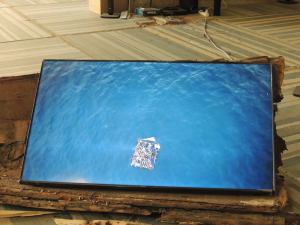
immortalised in the first Raft of the Medusa by Géricault, now in the Louvre.
Sadly, I found the contributions of the South African artists rather insubstantial in comparison.
Sampson pulled out after 40 minutes, but Ruby and I saw every single thing; I was proud of my inquiring kids. I also felt immensely privileged to have been given such a window into contemporary continental shifts in the art world.
In the time we had left before rush hour, we sought out Nathan’s highlight of the Fringe so far: Chez Joe Ouakam on Rue Jules Ferry. As we entered the space, an intriguing old feller stood up and waved in genial greeting and we assumed he knew the people who were coming in behind us. Afterwards I was doubtful about that, as he did it for everyone who followed.

But I felt awkward being present in the context of Euro tourists with fat cameras and didn’t feel I could communicate who we were… I just left a thank you note.
Joe Ouakam, a.k.a. Issa Samb, is a legendary figure in Senegal’s Agit-Art movement and there were a thousand questions I longed to ask but there were too many people milling around. Though I didn’t manage to exchange more than a word or two with him, Joe still succeeded in giving me the best present of all – a festival programme!
What a special day in our lives. I felt that if I saw nothing else, I’d at least got a flavour of the best of the fest that day. To top it all, Zola even squeezed in a surf on the way home.
The Art of Throwing A Party
Our last but one weekend in Dakar, we vacated our berth outside Ngor Lounge to make way for a wedding party. Sampson had been complaining that the clutch felt a bit hard, and as we pulled into our sewage vidange place around 3.30pm on the Saturday, the ball joint broke, snapped clean off. Another truck driver there identified the problem, and sent it off to be soldered for 1500FCA, but immediately it broke again.
This Breakdown no.14 threatened to wreck the weekend, substituting my planned Saturday night on the town with a unscheduled sleepover in the sewage works. But with the help of an English speaking Gambian, Sampson miraculously found the part for 5000FCA (R100) at the fourth place he asked at – and somehow the driver installed it, as I was cooking, just before they shut at 6.30pm. M. Sayé shook his head when I offered him payment “It was just what any friend would do”. I had to force him to take a 5000FCA note “for your family” if not for his pains.
After supper and showers it was 8pm. Sampson was keen to abandon the whole idea of driving into town for a jol, but I insisted and it turned out to be an easy trip. Up until the last 10m of wide road to the roundabout outside the station, that is – right in front where the police were hanging out waiting to nail drivers “coming down the wrong way”. There was no ‘One way’ sign displayed – Sampson went back to check – so we were braced for the good cop/grumpy cop routine they pulled.
Good Cop told me Grumpy was “very by the book – it’s will be 12000FCA (R240) to make the infraction disappear”. I, however, was determined not to break our duck for bribes, so we parked outside and waited very patiently, while Grumpy Cop avoided us and nailed several others. After 15 minutes, we invited Good Cop in and were nice and chatty. He was thoroughly overawed, both by the truck construction and a glamorous smiling Ruby. Good Cop ended up leaving Sampson’s licence behind on the table and fobbing Grumpy off.
Meanwhile, in the half hour we were waiting outside la Gare, Big Reg had become an art installation. We had visitors from Cameroon and Togo, and then the Secretary Generale of the Biennale himself turned up for a truck tour!

Not to mention the dancers, b boys flipping, spinning on their heads and doing full somersaults onto the concrete – hectic!
Upstairs, there was fashion on display. While Nathan was trying on jackets that made him look like Prince, this fuschia-turbaned goddess told me how the Senegalese don’t value their own simple style, but always try to bling it up. She bewailed the fact that it took a French man to recognise the value of their heritage (the old station building) and launch a campaign to rescue it from demolition.
Nathan introduced me to the man in question, Erwan Le Vigoureux. He truly is as ardent as his name suggests, being the founder of Dakar’s most prolific underground art collective, Les Petits Pierres. He was producing and promoting parties most nights of the Biennale month and (being also father to a young family) should probably be rechristened Erwan Le Exhausted by now.
Erwan had already been told about us by Jérôme Barth of La Sénégalaise de L’Automobile, his major sponsor (and patron of many of the more cutting-edge Fringe events) and he was happy for us to park off outside. We went to bed at midnight, after greeting Mina arriving from her bellydancing gig. The music only went off at 3am but it still felt amazing to doze off safely outside a night club. I couldn’t imagine sleeping so soundly in a similar spot in Jo’burg or London?
Sampson loves how Dakar party vibes are so genuine – there were no huddles outside mulling or gathered round a spliff and hardly any drunks either. The crowd were genuinely high on human interaction and art. There was an incredibly focused feeling of togetherness, the exhilaration of celebrating a culture so progressive and so vibrant it was practically morphing before your eyes.
The next morning, the kids and I took advantage of our city centre berth and walked up to the Hotel de Ville to check out their exhibition. It was well worth it, although we found the setting more attractive than the artwork, some of which reminded Ruby of an unfinished school project.

would have impressed me a lot more if we were allowed to play on them rather than them sitting uselessly fenced off.
Sadly, I think we were more excited to discover, in the Citydia supermarket next door, Ruby’s new favourite treat: dried baobab strips.
Before we left, we filled up with water at the nearby Total garage. The Lavage guy was a bit reluctant to give us any at first, so Sampson did lots of magic for him and ended up drawing quite a crowd for a sleepy Sunday. This is where we met the first ever magician en route who reciprocated by showing him some tricks.
Meanwhile I was inside the truck chatting with Yoyo the butterfly artist.

He told me it was his grandfather M. Doudou Diaw who was the first to think of creating art from fallen butterfly wings…
It took a while to chose which one Nana would like best for her anniversary present, but in the end the kids and I plumped for two love birds over women with parasols. He asked 10000FCA (R200) and I didn’t bargain at all as I thought Yoyo’s work was of a higher quality than much I saw exhibited that month. He had never heard of the Biennale. I told him to go down to la Gare and ask if he might display there.
At this point, Sampson appeared with his audience to give them a quick tour. As the truck filled up, I felt a little uneasy as three tall guys hung in the doorway then quickly disappeared. I hadn’t known Sampson had put the iPod on charge in the kitchen plug; only that night did he realise it had disappeared. It was a good reminder to stop being complacent about the friendliness of West Africa before moving North, but a sad loss: there were long stretches of Sahara where we missed singing along to our favourite songs. We hope the thieves enjoyed the BBC Miss Marple dramatisations as much as the kids did, but we doubt it.
The Art of Creating a Pan-African Icon
The following week, on way back to Ngor from LASA, we finally got to visit the African Renaissance Monument.
We were grateful to be charged the African/resident rate of 3000FCA each (R60) rather than international tourists 6500FCA, and Zola was granted an enfant rate of only 500FCA.

This was quite reasonable when you consider the Monument’s building costs of €30 million need to be recouped.
“Message to the Youth
Young people of Africa and the Diaspora, if one day your steps carry you to the feet of this Monument, think of all those who have sacrificed their freedom or their lives for the Renaissance of Africa”
At 49m high, the Monument is the tallest statue in Africa. Born of a millennial enthusiasm for a rebirth of a pan-African outlook amongst some of the continent’s leaders, it was supposed to herald a new dawn of African pride.

to educate visitors around aspects of resistance to colonialism and heroes long overlooked by history…
Our dapper tour guide, with the jacket and demeanour of a headmaster, told us that the statues of SuperAfricanMan and his Family were made of copper: 100 tonnes for the man, 70 for the woman and 20 for the baby.
The Monument is bigger than Statue of Liberty, and the father faces west towards it across the Atlantic holding the baby who symbolically points to the future, while the mother holds her hand backwards acknowledging the sacrifices made by her people in the past.

amongst the many gifts given by the African leaders who graced the inauguration in this very room – preserved for posterity.
I was embarrassed Thabo hadn’t even sent a card.
For all Mbeki’s faults (several million unnecessary deaths from withholding HIV treatment among them), I have to take my hat off to his promotion of the vision of an African Renaissance first conceptualised by the towering Senegalese polymath Cheikh Anta Diop, and his efforts to inspire his peers to see beyond purely national interest (or purely individual as with our current incumbent).
Since his tenure, the African Union has become a much more powerful organization. After complaining of double standards at the ICC, the AU put teeth into African justice by asking Senegal to host the first ever war crimes trial of an African leader in Africa.
In 1990 ousted president Hissene Habre escaped from Chad to Senegal, and resigned himself to a life of luxury in Ouakam – Nathan’s neighbourhood and Sampson’s favourite surf spot. But when in 1998 Pinochet was arrested in Spain and put on trial for crimes committed in Chile, Habre’s Chadian victims ramped up their calls for the prosecution of ‘Africa’s Pinochet’.
He was first arrested 16 years ago, but former Senegalese President Wade lacked the political will to enforce the law; current President Macky Sall moved forward to establish a special court to try him in 2013. The prosecuting lawyer still has shrapnel in her leg from a grenade attack Habre organized on her 15 years ago. The 30th May was a proud day to be present in Dakar when, after a 25 year campaign to bring him to justice, the verdict condemning him to a life sentence was finally delivered in a city court.






















































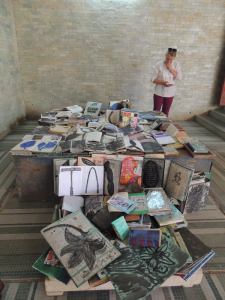










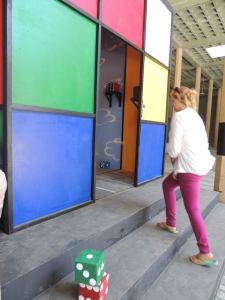













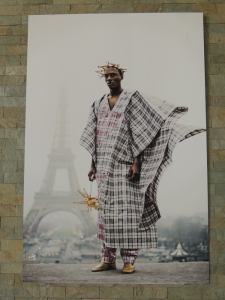










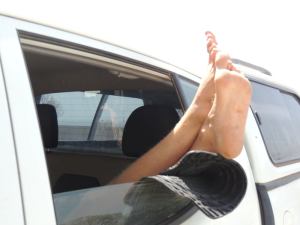














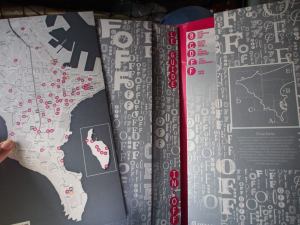








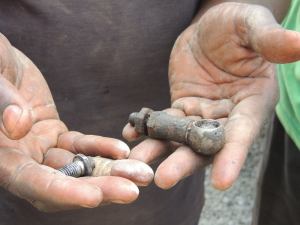






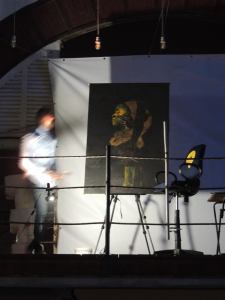







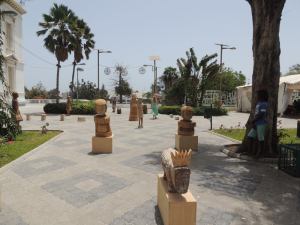





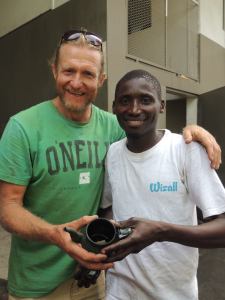





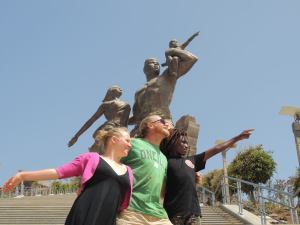














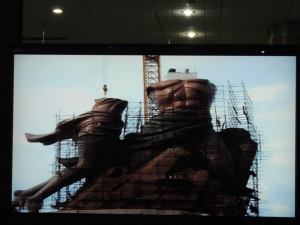








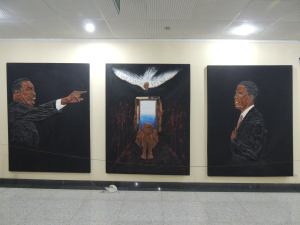


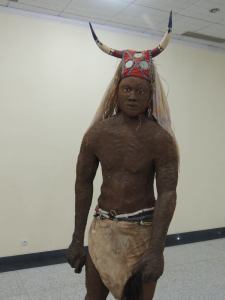


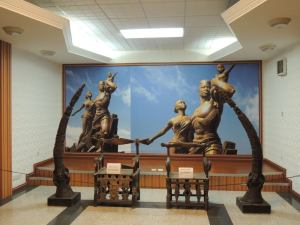



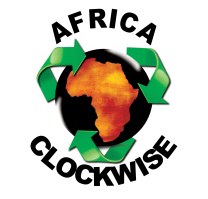

Pingback: Saint Louis: An Audience with Zoumba | Africa Clockwise